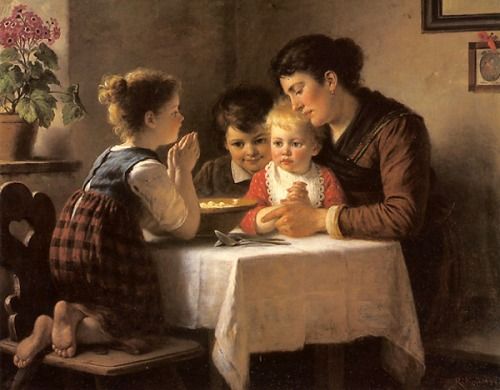In addition to the increase of the secularization of culture and lukewarm Catholics that I discussed in Part 1, the understanding of Christian femininity is in a very unfortunate place right now. Feminism has flooded the secular world and a remarkable part of the Church, as well. Of course, there’s the idea of the woman priesthood from the radically liberal side. But even in conservative circles women’s gifts have morphed quite dramatically over the last fifty years. Humility and gentleness in women are not seen as nearly important as more traditionally masculine attributes, such as the ability to provide for a family.
What does all of this have to do with evangelization? If we have such a poor, diluted idea of Christian femininity, then we probably have an incomplete or nearly upside-down idea of how women should be evangelizing.
Mary, Mother of the New Evangelization
If a woman is moving in the opposite direction of how Mary lived her life, she is going the wrong way. So let us stop and see the way Mary went and follow her.
How did Mary evangelize? She certainly did not become a priest nor did she follow the apostles to tell the world the good news of the Gospel. She stayed in a little house, did simple housework, and cared for her husband and child. Later, after Christ died, she also taught other women how to live holy lives, but in simple and quiet ways. And she prayed—a lot.
Mary was the perfect woman. God entrusted her with Christ. She did not have original sin on her soul.
Generation after generation has shown women to be in the home, taking care of their children, and exercising their specifically feminine gifts and attributes. Why? Because feminine gifts were needed. And to think that now, in our modern society, these specifically feminine gifts–which Mary lived so perfectly–are no longer needed is simple intellectual and common-sensical insanity.
The Hand that Rocks the Cradle
If we are no longer living in Christendom, what does this mean for us as mothers? It means we probably won’t get the same sort of support from others as mothers received in the past. It means we probably don’t have customs and traditions engrained into our family life. And, most alarmingly, it means our children are far more likely to be exposed to anti-Christian values.
What we, as mothers, choose to do in our current situation will undoubtedly affect the next generation of souls. What we choose to do with our time, attention, energy (both mental and physical) will impact the world around us much more than we realize. Each mediocre moment does matter. Our names will most likely be forgotten, but our actions will have consequences that last for generations and, indeed, for all eternity.
Yes, I suppose this is my little feminine battle cry. We, as women like the holy Virgin, are the most feared by the evil one himself. We desire souls for Christ. We want to do our part in the great evangelization of our time period. We want to take up for the fight for the souls of our loved ones.
Dignity of the Home
And we will win this fight from within our homes. Marvelous, isn’t it? That God would give us mothers so much power that we can work wonders without leaving our homes. Much like St. Therese of Lisieux and St. Clare of Assisi, their convents and monasteries are where their light shines far and wide. Furthermore, it is when we choose to leave our homes that our power is diminished and desolate. Our homes are left without hearts and our flame is barely kept alive, if kept alive at all.
From our homes we bear our children. Nurse them. Care for them. As they grow, we nurture their minds and bodies. We give them good books to read and properly establish their consciences and grow their virtues. We support our husbands, who must go out into this secular anti-Christian war field day after day. We pray that they do not lose their souls, for we as traditional Catholic wives recognize the gravity of that potential.
We must fight for the souls of our husband and children. Is it not our responsibility? Is it not our vocation as mothers to care for the souls of those entrusted to us? We are not priests. We are not missionaries. Our children may be someday. But they certainly won’t be on fire with the Truth if there is no mother to teach it to them and to truly engrain into them that they are cherished, honored, and beloved first by their mothers. A mother does much more good nursing her baby than any action she can do outside of the home.
The Seed of Evangelization
Alice von Hildebrand speaks of the beauty and importance of femininity like no other. In her book, Man and Woman: A Divine Invention, she writes:
“Feminists look down upon homely tasks as demeaning and feel that such tasks are unworthy of them. Mary teaches us that love and humility are two facets of the same jewel. What matters is not so much what we do but with how much love we do it. Anyone who loves the Blessed Virgin and wishes to imitate her cannot possibly look down upon housework as demeaning: it is meant to be a symphony of love. Whether it is cooking or washing, if it is done as a service to God, it certainly glorifies Him more than arrogant ‘business’ or intellectual work.”
So what is our role in evangelization? Perhaps the question should be: Where are we to take up our role? The place is where it has always been: In our home. And until mothers can find their place once again, little evangelization will be possible and the steady decline in the Faith will continue.
The renewal of the mother in the home is the very seed of evangelization. It is the hope. It is the bright and shining light pouring from our little Nazareths that will not be extinguished—not if we fight for it. Yes, we mothers must do our part in evangelization. Many souls depend upon our humble, quiet, and hidden work.








